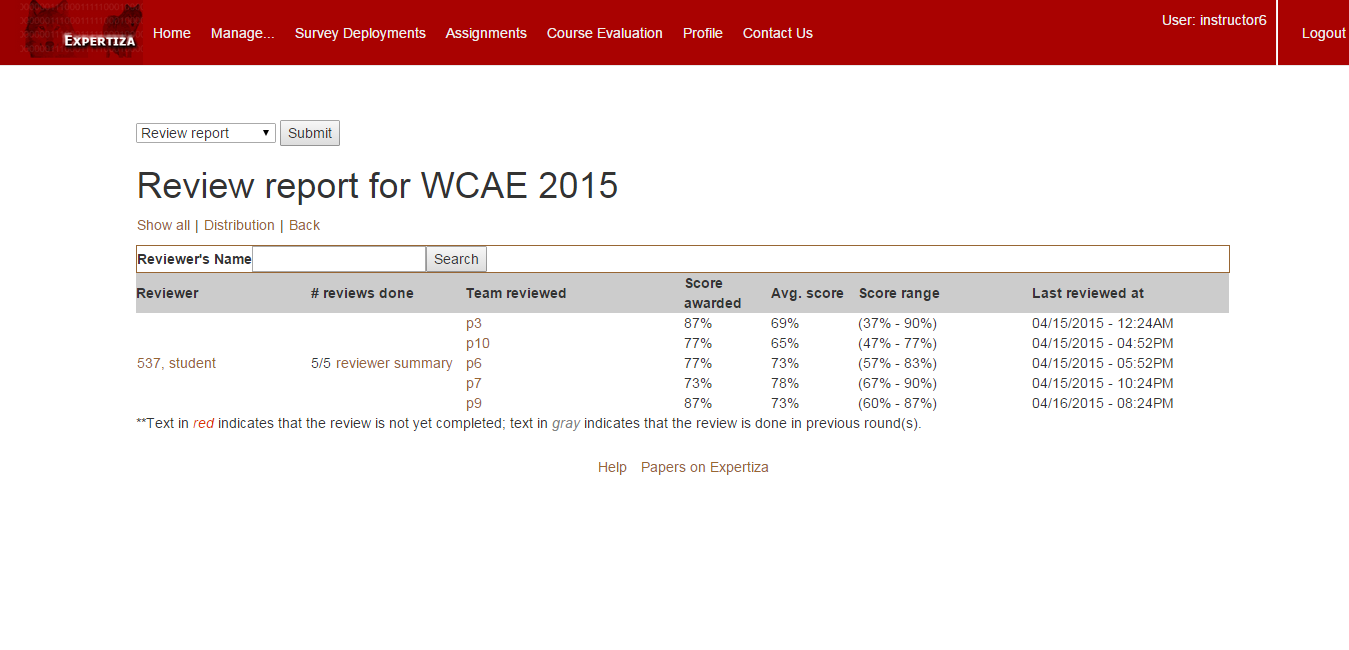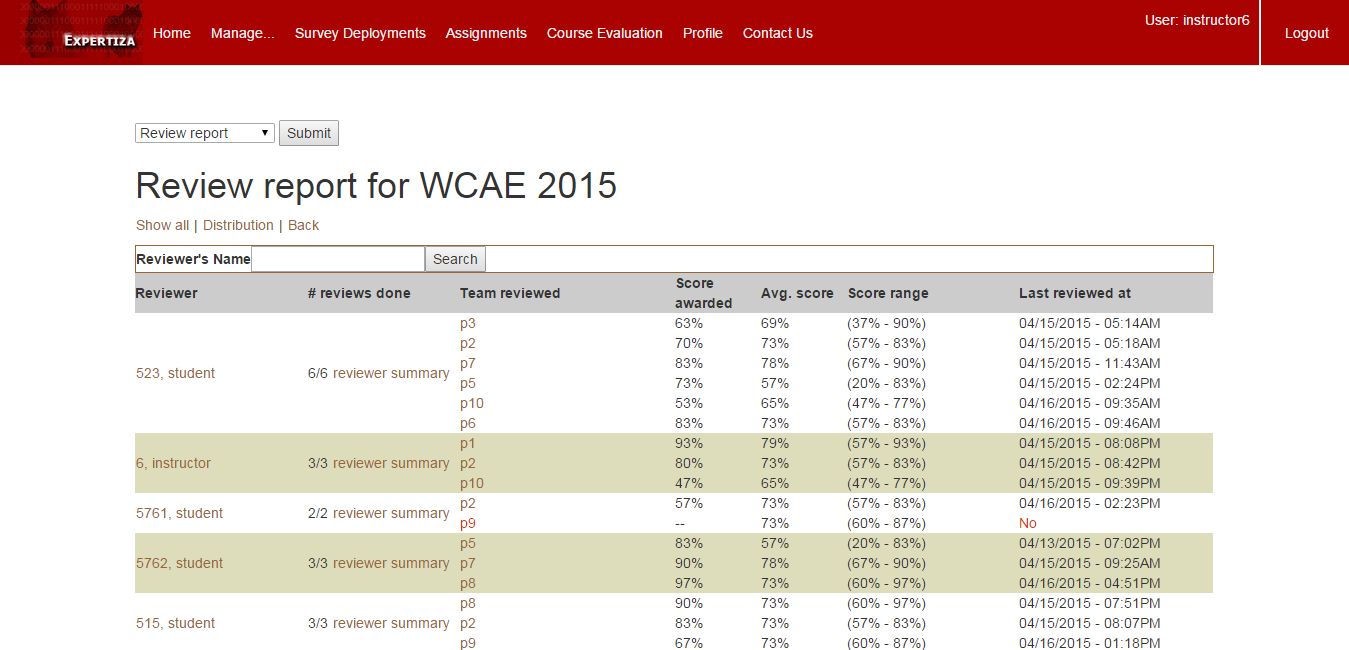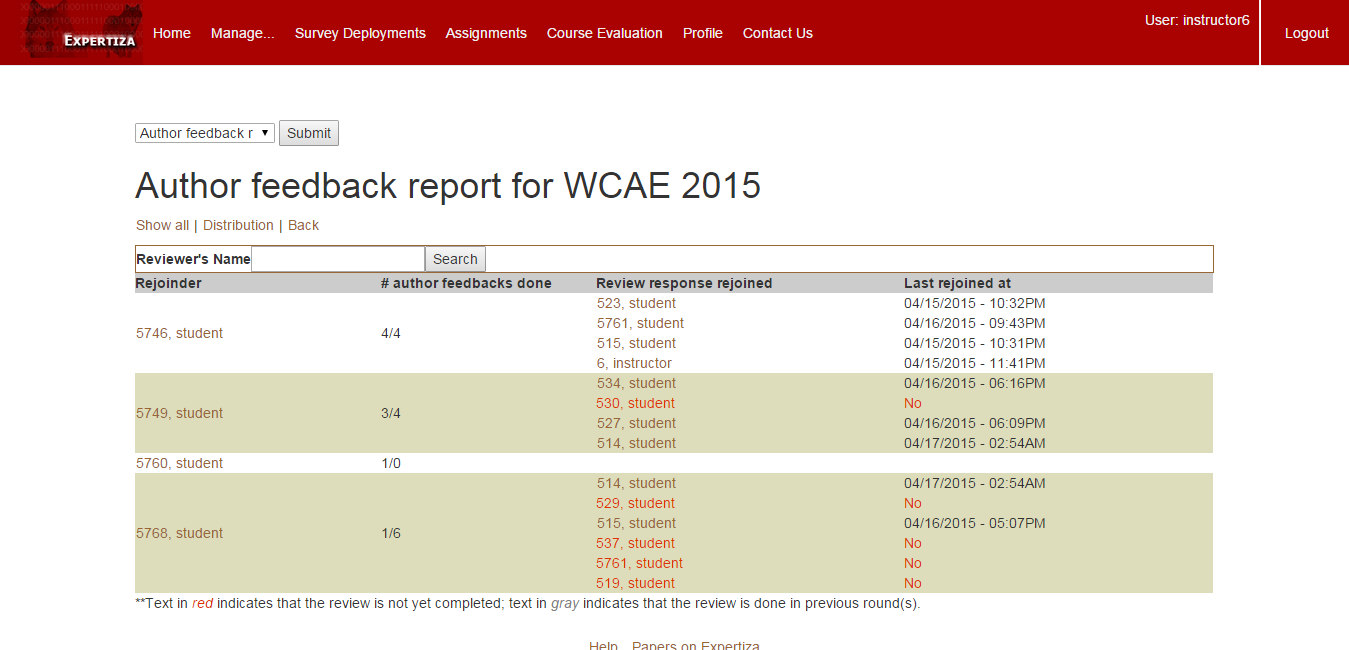CSC/ECE 517 Fall 2015/oss E1569 JNR: Difference between revisions
No edit summary |
No edit summary |
||
| (23 intermediate revisions by 2 users not shown) | |||
| Line 1: | Line 1: | ||
<font size="5">E1569: Refactoring ReviewMappingController</font><br><br> | <font size="5">E1569: Refactoring ReviewMappingController</font><br><br> | ||
This page provides a description of our Expertiza-based OSS project, which aimed at refactoring the ReviewMappingController. | This page provides a description of our Expertiza-based OSS project, which aimed at refactoring the ''ReviewMappingController''. | ||
=Introduction= | =Introduction= | ||
| Line 9: | Line 9: | ||
=Development environment setup= | =Development environment setup= | ||
Ensure that MySQL is already setup on your system. If you are using an Ubuntu system, the following commands can be used to install MySQL: | |||
sudo apt-get install mysql-server | |||
sudo apt-get install mysql-client | |||
===Clone the reopsitory=== | |||
In your local directory, clone the updated GitHub repository. | |||
git clone https://github.com/rrpod/expertiza.git | |||
Visit https://help.github.com for getting more information on setting up git. | |||
===Installing Gems=== | |||
Go to the local expertiza directory: | |||
bundle install | |||
===Running the test cases=== | |||
From the expertiza directory, run the following command: | |||
rspec spec/controllers/review_mapping_spec_controller_spec.rb | |||
=Problem statement= | =Problem statement= | ||
The ReviewMappingController file in this application (review_mapping_controller.rb) is responsible for setting up mappings between reviewers and reviewees. It essentially connects a reviewer to an assignment. However, it is a fairly bloated file since it has to handle functionality for five different kinds of maps (review response, author feedback, teammate review, meta-review, and quiz response). It is a prime choice for refactoring because the refactoring can clarify the intent of the different methods in the file. | The ''ReviewMappingController'' file in this application (review_mapping_controller.rb) is responsible for setting up mappings between reviewers and reviewees. It essentially connects a reviewer to an assignment. However, it is a fairly bloated file since it has to handle functionality for five different kinds of maps (review response, author feedback, teammate review, meta-review, and quiz response). It is a prime choice for refactoring because the refactoring can clarify the intent of the different methods in the file. | ||
According to the problem statement<ref>https://docs.google.com/document/d/1uWs3zyrupTmrOFuv5IbVWCF4NRvCXqJmg8dZ0wCqgus/edit</ref>, there were 11 tasks involved in refactoring the ReviewMappingController: | According to the problem statement<ref>https://docs.google.com/document/d/1uWs3zyrupTmrOFuv5IbVWCF4NRvCXqJmg8dZ0wCqgus/edit</ref>, there were 11 tasks involved in refactoring the ''ReviewMappingController'': | ||
* Method ''delete_rofreviewer'' should do the same thing as delete_metareviewer | * Method ''delete_rofreviewer'' should do the same thing as delete_metareviewer | ||
| Line 29: | Line 51: | ||
= Design Approach = | = Design Approach = | ||
In the process of refactoring, we have actively followed the Ruby coding guidelines <ref>https://docs.google.com/document/d/1qQD7fcypFk77nq7Jx7ZNyCNpLyt1oXKaq5G-W7zkV3k/edit#</ref>. We have also followed some design pattern rules like Single Responsibility Principle <ref>https://en.wikipedia.org/wiki/Single_responsibility_principle</ref>, which state that every class should have responsibility over a single part of functionality provided by software and that responsibility should be entirely encapsulated by the class. All the services and operations within the class should be aligned with that responsibility. | |||
== Refactoring == | == Refactoring == | ||
=== delete_rofreviewer === | === delete_rofreviewer === | ||
This function has duplicate functionality to another function, delete_metareviewer, and the other | This function has duplicate functionality to another function, delete_metareviewer, and the other function is named much better. The method delete_rofreviewer was removed. | ||
=== delete_participant === | === delete_participant === | ||
This function was confirmed to not | This function was confirmed to not being used, since there is no other function in the application that calls it. Therefore, it was removed. | ||
=== list_sortable === | === list_sortable === | ||
This function was confirmed to not | This function was confirmed to not being used, since there is no other function in the application that calls it. Therefore, it was removed. | ||
=== automatic_review_mapping_strategy === | === automatic_review_mapping_strategy === | ||
| Line 66: | Line 87: | ||
=== delete_review === | === delete_review === | ||
This function was confirmed to not be used, since there is no other function in the application that calls it. Therefore, it was removed. | This function was confirmed to not be used, since there is no other function in the application that calls it. Therefore, it was removed. | ||
==About rspec== | |||
[http://rspec.info/ Rspec] is a Behavior-driven development for Ruby programming language widely used for Test Driven Development. It has its own mocking framework based upon JMock. <ref>https://en.wikipedia.org/wiki/RSpec</ref> | |||
== Testing == | == Testing == | ||
=== Test Case Development using RSpec === | === Test Case Development using RSpec === | ||
====Test Case 1: Check if on getting release mapping it redirects to student review controller==== | |||
it "should use release_mapping to redirect to student_review controller" do | |||
get :release_mapping, id: @assignment.id | |||
expect(response).should redirect_to(:controller => 'student_review', :action => 'list', :id=> '828') | |||
end | |||
====Test Case 2: Check if on delete outstanding reviewers it redirects to list mapping==== | |||
it "should delete outstanding reviewers to redirect to list_mappings" do | |||
get :delete_outstanding_reviewers, id: @assignment.id, contributor_id: 200 | |||
expect(response).should redirect_to(:action => 'list_mappings', :id => 200) | |||
end | |||
====Test Case 3: Check if rendered report matches the required template==== | |||
it "should render appropritate response report" do | |||
get :response_report, id: 723 | |||
response.should render_template(:response_report) | |||
end | |||
====Test Case 4: Check if rendered report matches the required template for a specific user==== | |||
it "should render appropriate response report for the specific user" do | |||
get :response_report, id: 723, :user => {:fullname=> '523, student'} | |||
response.should render_template(:response_report) | |||
end | |||
====Test Case 5: Check if rendered report matches the required template for a specific user with type FeedbackResponseMap==== | |||
it "should render appropriate response report for the specific user with type FeedbackResponseMap" do | |||
get :response_report, id: 723, :report => {:type=> 'FeedbackResponseMap'} | |||
response.should render_template(:response_report) | |||
end | |||
=== Testing from the UI === | === Testing from the UI === | ||
View Response Report | '''View Response Report''' | ||
[[File: | [[File:View_assignment_response_report.png]] | ||
View Response Report by name | '''View Response Report by name'''<br> | ||
[[File: | Search for Reviewer's name "523, student" | ||
[[File:Copy_view_response_report_by_name_-_Copy.png]] | |||
View Feedback Response Map | '''View Feedback Response Map''' | ||
[[File: | [[File:Copy_view_feedback_response_map_report_-_Copy.png]] | ||
= Conclusion = | = Conclusion = | ||
By refactoring ReviewMappingController, extraneous and unused code was removed, readability was increased, and tests confirm that its functionality remained intact. Users will experience incrementally better performance, and developers will have an easier time getting up to speed on the software, resulting in heightened developer efficiency and faster turnaround times for new features. | By refactoring ''ReviewMappingController'', extraneous and unused code was removed, readability was increased, and tests confirm that its functionality remained intact. Users will experience incrementally better performance, and developers will have an easier time getting up to speed on the software, resulting in heightened developer efficiency and faster turnaround times for new features. | ||
= Project Links = | = Project Links = | ||
Latest revision as of 02:55, 8 November 2015
E1569: Refactoring ReviewMappingController
This page provides a description of our Expertiza-based OSS project, which aimed at refactoring the ReviewMappingController.
Introduction
Expertiza is an Open Source software tool developed at NC State University. It is used to facilitate assignment and course management. It is primarily intended to facilitate assignments being peer reviewed. It is written as a Ruby on Rails application, thus functioning natively in a web environment. It can be cloned from GitHub.
Refactoring
Refactoring is a process designed to change code without modifying the functionality. Refactoring can improve the readability and the logical design of the software, making sure everything is in the right place and has the right name. This allows code to be understood more quickly by a developer, which shortens the time it takes to develop new features.
Development environment setup
Ensure that MySQL is already setup on your system. If you are using an Ubuntu system, the following commands can be used to install MySQL:
sudo apt-get install mysql-server sudo apt-get install mysql-client
Clone the reopsitory
In your local directory, clone the updated GitHub repository.
git clone https://github.com/rrpod/expertiza.git
Visit https://help.github.com for getting more information on setting up git.
Installing Gems
Go to the local expertiza directory:
bundle install
Running the test cases
From the expertiza directory, run the following command:
rspec spec/controllers/review_mapping_spec_controller_spec.rb
Problem statement
The ReviewMappingController file in this application (review_mapping_controller.rb) is responsible for setting up mappings between reviewers and reviewees. It essentially connects a reviewer to an assignment. However, it is a fairly bloated file since it has to handle functionality for five different kinds of maps (review response, author feedback, teammate review, meta-review, and quiz response). It is a prime choice for refactoring because the refactoring can clarify the intent of the different methods in the file.
According to the problem statement<ref>https://docs.google.com/document/d/1uWs3zyrupTmrOFuv5IbVWCF4NRvCXqJmg8dZ0wCqgus/edit</ref>, there were 11 tasks involved in refactoring the ReviewMappingController:
- Method delete_rofreviewer should do the same thing as delete_metareviewer
- Method delete_participant is not used
- Method list_sortable is not used
- Method automatic_review_mapping_strategy is too long
- Method review_report has SQL-like code
- Method add_user_to_assignment should not be in this controller
- Method get_team_from_submission should not be in this controller
- Method delete_all_reviewers doesn’t actually delete all the reviewers, but just the outstanding review response maps. We want to keep this functionality
- Method delete_participant should not be in this controller
- Method name release_reservation doesn’t describe the functionality well
- Method delete_review is not used
Design Approach
In the process of refactoring, we have actively followed the Ruby coding guidelines <ref>https://docs.google.com/document/d/1qQD7fcypFk77nq7Jx7ZNyCNpLyt1oXKaq5G-W7zkV3k/edit#</ref>. We have also followed some design pattern rules like Single Responsibility Principle <ref>https://en.wikipedia.org/wiki/Single_responsibility_principle</ref>, which state that every class should have responsibility over a single part of functionality provided by software and that responsibility should be entirely encapsulated by the class. All the services and operations within the class should be aligned with that responsibility.
Refactoring
delete_rofreviewer
This function has duplicate functionality to another function, delete_metareviewer, and the other function is named much better. The method delete_rofreviewer was removed.
delete_participant
This function was confirmed to not being used, since there is no other function in the application that calls it. Therefore, it was removed.
list_sortable
This function was confirmed to not being used, since there is no other function in the application that calls it. Therefore, it was removed.
automatic_review_mapping_strategy
This function was originally too long. Hence, we modularised it by moving the part of the code that loops over all teams and creates the ReviewResponseMap into a new function.
response_report
To make this code easier to read for a pure Ruby developer, the SQL-like code was rewritten with ActiveRecord.
add_user_to_assignment
This method does not belong in this controller, and it is only ever called by participants_helper. Therefore, the method should go into participants_controller, which is where it was moved.
get_team_from_submission
This method is responsible for returning the team given an assignment submission. It did not have any direct correlation with the reviewer/reviewee. Hence, it was moved to the AssignmentTeam model (assignment_team.rb) file as suggested.
delete_all_reviewers
Since the only problem with this method is that the name does not describe the actual or intended functionality, we replaced all instances of “delete_all_reviewers” with “delete_outstanding_reviewers”.
delete_participant
This function was confirmed to not be used, since there is no other function in the application that calls it. Therefore, it was removed.
release_reservation
Since the method name does not accurately describe the functionality within, all instances of “release_reservation” were replaced with “release_mapping”.
delete_review
This function was confirmed to not be used, since there is no other function in the application that calls it. Therefore, it was removed.
About rspec
Rspec is a Behavior-driven development for Ruby programming language widely used for Test Driven Development. It has its own mocking framework based upon JMock. <ref>https://en.wikipedia.org/wiki/RSpec</ref>
Testing
Test Case Development using RSpec
Test Case 1: Check if on getting release mapping it redirects to student review controller
it "should use release_mapping to redirect to student_review controller" do
get :release_mapping, id: @assignment.id
expect(response).should redirect_to(:controller => 'student_review', :action => 'list', :id=> '828')
end
Test Case 2: Check if on delete outstanding reviewers it redirects to list mapping
it "should delete outstanding reviewers to redirect to list_mappings" do
get :delete_outstanding_reviewers, id: @assignment.id, contributor_id: 200
expect(response).should redirect_to(:action => 'list_mappings', :id => 200)
end
Test Case 3: Check if rendered report matches the required template
it "should render appropritate response report" do
get :response_report, id: 723
response.should render_template(:response_report)
end
Test Case 4: Check if rendered report matches the required template for a specific user
it "should render appropriate response report for the specific user" do
get :response_report, id: 723, :user => {:fullname=> '523, student'}
response.should render_template(:response_report)
end
Test Case 5: Check if rendered report matches the required template for a specific user with type FeedbackResponseMap
it "should render appropriate response report for the specific user with type FeedbackResponseMap" do
get :response_report, id: 723, :report => {:type=> 'FeedbackResponseMap'}
response.should render_template(:response_report)
end
Testing from the UI
View Response Report by name
Search for Reviewer's name "523, student"

Conclusion
By refactoring ReviewMappingController, extraneous and unused code was removed, readability was increased, and tests confirm that its functionality remained intact. Users will experience incrementally better performance, and developers will have an easier time getting up to speed on the software, resulting in heightened developer efficiency and faster turnaround times for new features.
Project Links
- Run Expertiza hosted on VCL
- GitHub repository used for development
- GitHub pull request to merge to expertiza/master
References
<references/>

